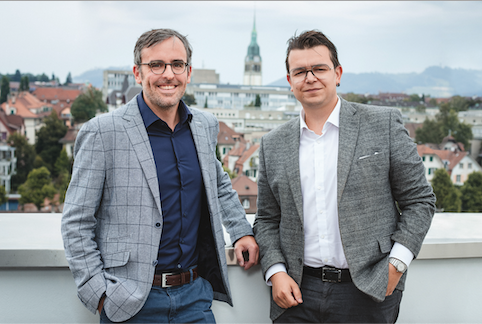Two BME alumni are key to the Swiss Medtech Award win 2019
This year´s Swiss Medtech Award is closely linked to the University of Bern Master´s in Biomedical Engineering: The BME graduates Marco Matulic and Juan Ansóare key to the success of this year´s winner CAScination AG. One worked on the company side and one at the University, and they were instrumental in the development of the winning technology.
Common beginnings – Joint Success
The finals Swiss Medtech Award 2019 took place in early June at the Kursaal in Bern. After a rigorous competition process over several months, three finalists were chosen. On the day, each team presented their nominated technology. For CAScination, Chief Technology Officer Marco Matulic “pitched” the Otoplan® and HEARO® robotic ENT microsurgery platform which is used to give deaf patients a cochlear implant hearing aid. In the audience Dr Juan Ansó,senior researcher at the ARTORG Center, kept his fingers crossed for his colleague because the CAScination technologies had partly originated in Juan’s doctoral research at ARTORG. Over the last five years, the two colleagues had worked very closely on the development of a robotic cochlear implantation technology. And both are graduates of the BME Master’s program at the University of Bern.
As the award ceremony approached in the Kursaal, Marco Matulic and Juan Ansó sat together withtheir team colleagues from CAScination and ARTORG. The projection of the three nominee names was running across the screen, only to stop at “The winner is: HEARO®”, and everyone erupted in a huge cheer: The close collaboration between the two BME Master’s alumni had awarded them the first prize.
Entrepreneur at heart
“I always wanted to be part of a business and one day even lead it”, says Chief Technology Officer Marco Matulic of CAScination. Marco started his career with an apprenticeship to become a qualified electrician but soon discovered that he wanted to deepen his engineering knowledge. After an undergraduate degree in Systems Engineering in St. Gallen und Buchs, he wanted to continue studies without losing time with the need to acquire additional entry credits to a Master´s program. “I came across the BME Master’s at the University of Bern, which accepted my undergraduate degree for a seamless entry into a postgraduate qualification. That sold it for me.”
Marco carried out his master’s project in the Image-Guided Therapies (IGT) group led by Professor Stefan Weber at ARTORG, working on the cochlear robot project in the very early stages. Following his graduation in 2015, Marco decided to join CAScination AG, a spin-out of the University of Bern founded by Stefan Weber, as the technology lead on the surgical robotic project. In this role at CAScination, he still interacted closely with the IGT group at the University and the Inselspital, as much of the technical and clinical research on the cochlear robotic procedure was taking place there.“Now I am leading a business that allows me to develop my ideas into products and services in the medical technology sector.”, he states. “The BME Master’s was a key step for me to decide that I wanted to stay in industry and not become an academic researcher. I found out that I am an entrepreneur at heart.”
BME Research in the operating room
Juan Ansó came to Bern in 2010 from several years in industry with an undergraduate degree in Telecommunications Engineering from the University of Zaragoza (Spain) to expand his knowledge in Biomedical Engineering. He chose the BME Master’s program at the University of Bern for its embedding into the clinical environment. “Through this Master´s, students are taught to understand and solve unmet clinical needs. These can only be tackled by biomedical engineers that directly work with clinicians – seeing patients, interventions and surgery almost every week”. Juan combined his BME studies with a part-time job working on the development of the cochlear robotic platform and followed his Master´s with a PhD to expand his research in neurology and ENT robotic surgery.
“Through the regular interaction with Marco Caversaccio, Director of the ENT, Head and Neck Surgery at Inselspital, I experienced how my research would be translated into the clinic.” The prototype robotic surgery platform Juan helped to research and build was used successfully at Inselspital to give 6 patients a cochlear implant, leading to a high profile publication in Science Robotics in 2017. This milestone allowed Juan to workside-by-side with the CAScination R&D team to help integrate his research findings into the award-winning HEARO® platform as an inventor of a university patent on this technology. “I had both: my research at ARTORG and seeing the technology that I helped to investigate and the process at CAScination of how this was turned into a product. This meant a lot to me, and it confirmed that I wished to remain in academia.” Juan will take the next step towards leading his own research group, investigating new technologies in neurology and neurosurgery for the treatment of Parkinson’s Disease, through a recently awarded SNSF research fellowship at the University of California San Francisco.

